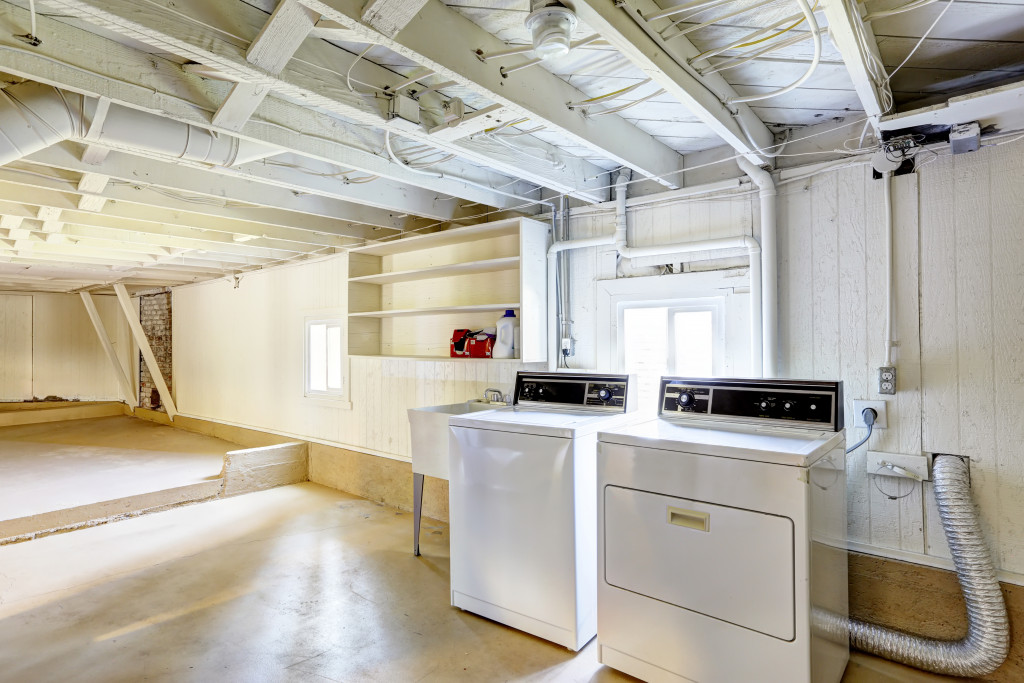If you’re like most people, your basement is a cluttered mess. It’s full of junk you never use and rarely think about. But what if I told you that organizing your basement could save you money and make your home more comfortable? Believe it or not, it’s true! In this article, we’ll discuss how to get your basement organized and ready for summer.

1. Look out for harmful chemicals in your basement before doing anything else
Before you start organizing, it’s important to get rid of any harmful chemicals that could be dangerous for your family. Look out for paints, pesticides, solvents, or other possible toxins. If you find these substances, call the appropriate authority to help remove them from your home immediately. Radon is another deadly gas that may build up in your basement naturally. Contact a radon mitigation specialist who can help get rid of it before you start to organize your basement.
2. Maintain the air conditioning system
If you have a window AC unit in your basement, don’t neglect it! Dust and dirt can quickly clog up the inside of the air conditioning system and make it less efficient. Make sure to schedule regular maintenance and cleanings for your AC unit (usually annually) to maintain its efficiency and airflow. Keeping this in good working order will keep your basement cool for years to come.
3. Look into improving insulation
If you have older windows or lack of insulation in your basement, this may be causing your AC unit to work harder than it needs to. If your basement is cold in the winter and hot in the summer, then you may need to work on improving insulation in your basement walls or windows before working on other problems.
4. Sort out the items you want to keep
This is a great time to sort out the items you want to keep from those things that need to be thrown away. Your personal belongings can probably go somewhere else in your home, so don’t hesitate to find another place for them. You can also sell any items you don’t want to keep in a garage sale or on online selling websites for used items. You can also donate them if they are still in good shape and may be used by others who might need them more.
5. Organize it
Now’s the time to make some serious headway with your basement organization. For items that may need to be fixed before you can use them, it doesn’t hurt to start fixing them while they’re still out of the way. Try using shoe boxes or small storage containers for organizing smaller items like screws and nails. This way, they’re easier to take out and replace.
6. Put shelving up (and use it)
Now that your basement is almost completely free of clutter, you need to make sure it stays this way by putting in some shelving. You can build your own shelves or hang up hooks for different purposes. If you already have shelves in your basement, make sure to use them by storing things in the appropriate places. There’s no point in making a mess of your nice clean basement again!
7. Be proactive about the items you are keeping in your basement
Now that your basement is free of clutter, you need to make sure not to bring it back. Whenever you see an item lying around that doesn’t belong, make sure to put it away right then and there! Also, if you find that you are bringing too much stuff into your basement, consider storing items offsite. Yard sales are a good option for selling old items, or you can bring them to a donation center if they are still in good shape.
8. Create zones for each type of activity that will take place in your basement
Zones can help you create a more efficient and organized basement. First, find the most suitable spots in your basement for each zone, and then label them accordingly. For example, if you want to create a play area with toys, make sure it’s an area that is easily accessible from the stairs with enough room to avoid any clutter or accidents.
9. Make a plan for dealing with seasonal items
Basement organization is not always a year-round task, but it can help to be prepared for when you’re ready for season changes. Have an area in your basement that is easy to access with plastic bins where you can store items like winter clothes and decorations, or fishing gear if you have a pool table. It’s also helpful to have a section for seasonal equipment or other athletic gear.
When you’re done organizing your basement and it’s completely free of clutter, make sure to stay proactive about what items go in there. It may be helpful to create zones for different activities so that the space stays organized and easy to use. If you plan ahead, seasonal changes won’t cause a mess again!

